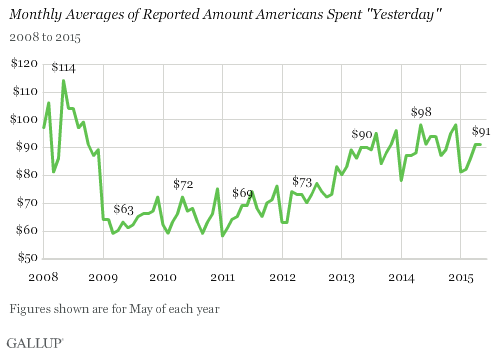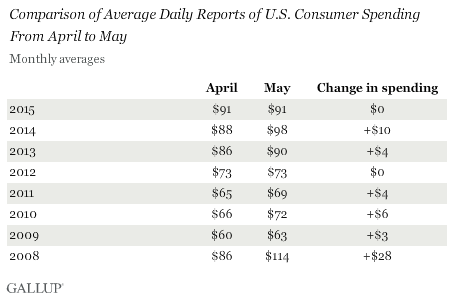Story Highlights
- Latest monthly spending average matches April's
- Americans usually spend more in May
WASHINGTON, D.C. -- Americans' daily self-reports of their discretionary spending averaged $91 in May, the same as in April. This stability follows three months of small increases in spending, according to Gallup tracking.

Spending reports last month were not as high as they were in May 2014, when average daily spending reached a six-year high of $98. Last May's spending level has largely gone unmatched since, except in December 2014, when spending also averaged $98. However, Americans typically spend more in December because of holiday shopping. Still, the latest monthly figure is higher than what Americans spent each May from 2009 through 2013. By contrast, Americans spent an average of $114 in May 2008 -- prior to the global financial meltdown later that year that both deepened and prolonged the U.S. recession that started in late 2007.
Gallup's daily spending measure asks Americans to estimate the total amount they spent "yesterday" in restaurants, gas stations, stores or online -- not counting home, vehicle or other major purchases, or normal monthly bills -- to provide an indication of Americans' discretionary spending. The May 2015 average is based on Gallup Daily tracking interviews with more than 15,000 U.S. adults.
May Usually a Month for Spending Increases
Most April-to-May comparisons since 2008 show slight to modest increases in spending, making the absence of such an increase this year a bit unusual. This is not unprecedented, however, as no change in spending took place between April and May 2012.

Spending increased substantially, by $28, in May 2008 amid soaring gas prices, and by $10 in May 2014.
Bottom Line
The stagnation in Americans' spending may be related to gas prices, which continued to rise last month -- though they are expected to plateau and eventually dip as the year progresses. Confidence in the economy also dipped, with lower weekly measures in May than in April. Gallup has found that Americans' perceptions of the economy are related to gas prices, and what they pay at the pump certainly influences how much they spend overall and how much they have left for discretionary purchases after they take care of the basics. If gas prices do stabilize, this may enable Americans to spend more on other things.
While Gallup's historical spending averages have generally been higher in the spring and summer months than in the winter, spending usually dips or stays flat in June compared with May. With consumer spending the major driver of U.S. economic growth, healthier spending in June could help keep the economy on a strong track toward recovery after a disappointing first quarter that saw the economy shrink.
These data are available in Gallup Analytics.
Survey Methods
Results for this Gallup poll are based on telephone interviews conducted May 1-31, 2015, on the Gallup U.S. Daily survey, with a random sample of 15,700 adults, aged 18 and older, living in all 50 U.S. states and the District of Columbia. For results based on the total sample of national adults, the margin of sampling error is ±1 percentage point at the 95% confidence level. The margin of error for the spending mean is ±$4. All reported margins of sampling error include computed design effects for weighting.
Each sample of national adults includes a minimum quota of 50% cellphone respondents and 50% landline respondents, with additional minimum quotas by time zone within region. Landline and cellular telephone numbers are selected using random-digit-dial methods.
Learn more about how Gallup Daily tracking works.

